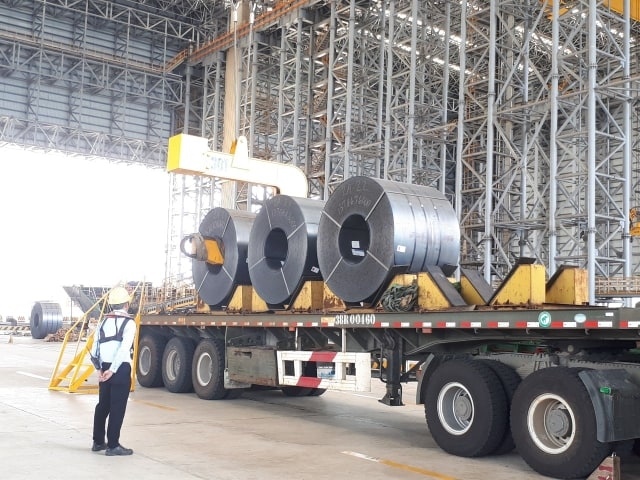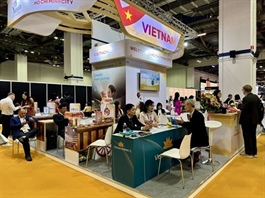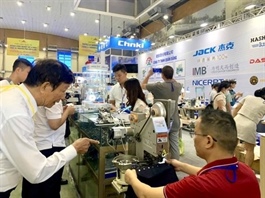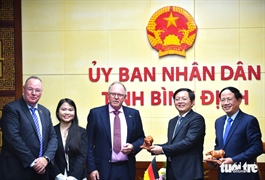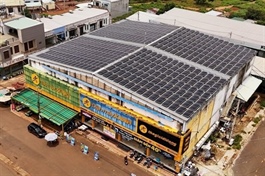Vietnamese entrepreneur shutters fashion line for fear of Chinese competition
Vietnamese entrepreneur shutters fashion line for fear of Chinese competition
Nguyen Thuy Linh Cat, founder of the CATSA fashion brand, made the tough decision to close all 22 of her stores in August, citing fierce competition with low-priced Chinese products.
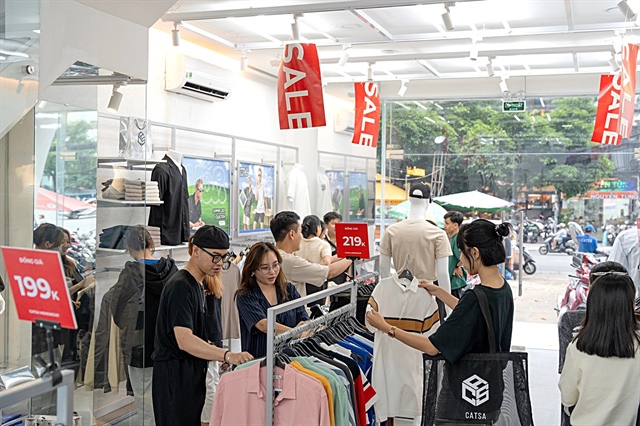
People go shopping at CATSA's store before the fashion chain closed in August 2024. Photo: L.C. |
In an interview with Tuoi Tre (Youth) newspaper, the 34-year-old entrepreneur explained that the closures were necessary to avoid being pulled into a price war she felt her business could not sustain.
The move underscores the growing pressure on local fashion brands in Vietnam, as they contend with an influx of budget-friendly imports from China.
"I’ve had to shift my business strategy, and many of my peers have also suffered revenue losses due to the surge of Chinese goods on platforms like Lazada and TikTok Shop," Cat said.
"Lately, we’ve also been hit by imports from Temu, Shein, and Taobao, supported by cross-border delivery services."
E-commerce wave
Cat’s journey into the fashion world began with a simple yet powerful vision: to create stylish, affordable clothing that resonated with the aspirations of the Vietnamese youth.
For over 13 years, CATSA flourished, becoming a household name among young consumers.
With dozens of stores across Ho Chi Minh City and revenues reaching hundreds of billions of Vietnamese dong annually, it appeared she had carved out a niche in a competitive market. (VND1 billion = US$39,347)
“I wanted to offer something that was not just fashionable but also accessible to everyone,” she told Tuoi Tre.
Her commitment to quality and affordability earned her brand a loyal following, as young people flocked to her stores, eager to embrace the latest trends without breaking the bank.
However, as her success grew, so did the challenges.
The retail landscape began to shift dramatically with the rise of e-commerce.
Platforms like Lazada and TikTok Shop became increasingly popular among consumers seeking convenience and variety.
Yet, this shift also brought an influx of cheap Chinese goods that would soon threaten local brands.
“I didn’t want to get caught in a price war with Chinese goods,” Cat admitted.
The competition has intensified since new players like Temu and Shein entered the Vietnamese market and quickly gained traction, offering products at rates that local businesses struggle to match.
The emergence of Chinese e-commerce platforms markes a turning point in Vietnam’s fashion industry.
These platforms have created a frenzy for inexpensive goods, pushing local brands into an unprecedented crisis.
As more consumers have turned to online shopping, many Vietnamese businesses are grappling with declining sales.
Cat said that her colleagues in the industry have also been feeling the strain.
“Many are suffocating under this pressure,” she said. “If this trend continues, it won’t be long before more brands close their doors.”
While reduced consumer spending plays a role in declining sales, another significant factor is the changing shopping behavior toward online purchases.
Vietnamese consumers have been increasingly drawn to e-commerce platforms where they can find cheaper alternatives from Chinese suppliers.
The price war
As competition has already heated up, many businesses are now forced into a relentless price war.
Sellers launch aggressive promotions and discounts through live-streaming sales on platforms like TikTok Shop.
To survive, many companies felt compelled to lower their prices drastically, a strategy that often leads to unsustainable practices.
“The pressure is unbearable," Cat complained.
"We’re not just competing against each other; we’re competing against factories and foreign goods.”
The flood of cheap Chinese products has made it increasingly difficult for Vietnamese brands to maintain their market share.
Moreover, these products often come with enticing offers -- zero shipping fees and lightning-fast delivery from China make them even more appealing to consumers.
Local businesses are finding it increasingly difficult to compete while maintaining quality and service, as Chinese products continue to dominate with their low prices.
During a visit to China, Cat uncovered disturbing insights into how these goods are produced and sold at such competitive prices.
Mass production capabilities allowed Chinese factories to operate at scale, significantly reducing expenses, while low labor costs and lax environmental regulations further contributed to these savings.
“China is essentially the raw material warehouse for the world,” she noted.
“They produce machinery for our industry at such low costs.”
In contrast, small- and medium-sized enterprises in Vietnam face numerous barriers, including compliance with environmental standards and various taxes, making it hard for them to compete.
This disparity had led many Vietnamese businesses to resort to importing Chinese products, relabeling them for resale, a practice that is becoming increasingly unprofitable as online platforms offer these same goods at lower rates directly to consumers.
A call for support
Despite these overwhelming challenges, Cat remains hopeful about the future of Vietnamese fashion.
She acknowledged, “The price war is brutal, many businesses will have to leave the market, but there’s still a way out.”
She believed that with concerted efforts from enterprises, consumer support, and favorable government policies, Vietnamese manufacturing can find a sustainable path forward.
Nguyen advocates for strategic government intervention to protect local companies from foreign competition while ensuring fair taxation on imported goods.
“We need mechanisms that level the playing field,” she emphasized.
For businesses like hers, focusing on quality rather than solely on price is crucial for survival.
Building strong brands that offer unique value will be essential in distinguishing themselves from cheaper alternatives.
Cat also insisted on fostering a community sense among consumers who value local products.
“Building a loyal customer base is essential,” she stated. “We need people who believe in our mission.”





